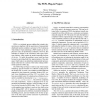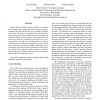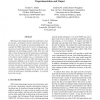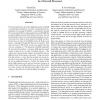99
Voted
QEST
2007
IEEE
15 years 7 months ago
2007
IEEE
We present a GUI-based tool supporting the stochastic process algebra PEPA with modules for performance evaluation through Markovian steady-state analysis, fluid flow analysis, ...
105
Voted
QEST
2007
IEEE
15 years 7 months ago
2007
IEEE
Failure Mode and Effect Analysis (FMEA) is a method for assessing cause-consequence relations between component faults and hazards that may occur during the lifetime of a system. ...
118
Voted
QEST
2007
IEEE
15 years 7 months ago
2007
IEEE
Among the many stages of a simulation study, debugging a simulation model is the one that is hardly reported on but that may consume a considerable amount of time and effort. In t...
QEST
2007
IEEE
15 years 7 months ago
2007
IEEE
—MOQA is a language specifically designed to facilitate average-case execution time analysis. It incorporates some innovative techniques to make this possible. Following on from...
100
Voted
QEST
2007
IEEE
15 years 7 months ago
2007
IEEE
—Performance Trees are a recently-proposed mechanism for the specification of performance properties and measures. They represent an attractive alternative to stochastic logics,...
104
click to vote
QEST
2007
IEEE
15 years 7 months ago
2007
IEEE
XML-based interchange formats for performance models provide a mechanism whereby performance model information may be transferred among modeling tools. For example, the PMIF allow...
QEST
2007
IEEE
15 years 7 months ago
2007
IEEE
Online auction sites have unique workloads and user behavior characteristics that do not exist in other e-commerce sites. Earlier studies by the authors identified i) significan...
104
Voted
QEST
2007
IEEE
15 years 7 months ago
2007
IEEE
We give an overview of GRIP, a symmetry reduction tool for the probabilistic model checker PRISM, together with experimental results for a selection of example specifications. 1 ...
116
click to vote
QEST
2007
IEEE
15 years 7 months ago
2007
IEEE
Previous studies have shown that buffering packets in DRAM is a performance bottleneck. In order to understand the impediments in accessing the DRAM, we developed a detailed Petri...




